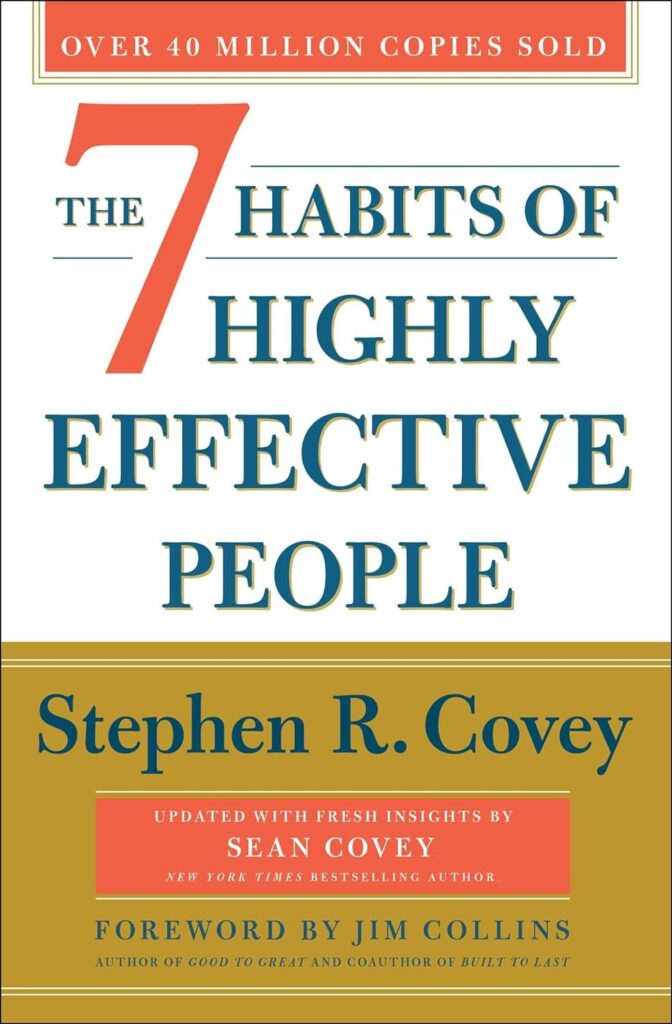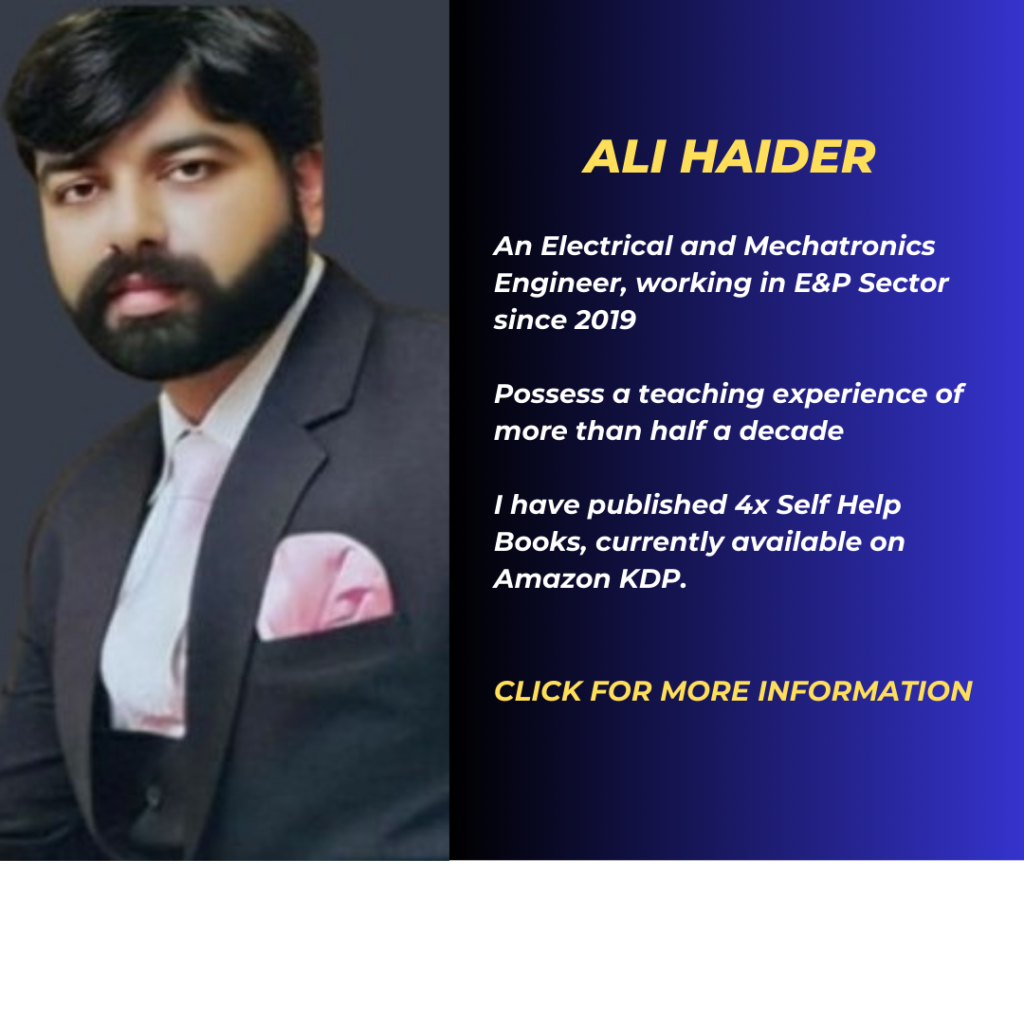
1 Line Summary
The 7 Habits of Highly Effective People is a self-help book that teaches readers how to be more proactive, organized, and effective in their lives.
What Will You Learn
This book will help you:
- improve your personal and professional effectiveness,
- take control of your life,
- set clear goals and achieve them,
- prioritize your tasks and focus on the most important things,
- build strong relationships and create a more positive environment.
Best Quotations from the Book
- “Between stimulus and response, there is a space. In that space is our power to choose our response. In our response lies our growth and our freedom.”
- “Effectiveness is the ability to get the right things done.”
- “Interdependence is the key to effective teamwork.”
- “The only way to make sense out of change is to plunge into it, move with it, and join the dance.”
- “The more you control your own energy, the more control you have over your life.”
- “The purpose of life is to grow and to become everything that you were created to be.”
Key Takeaways
In this book, Covey outlines seven habits that are essential to becoming a highly effective person. These habits can be applied to various aspects of life, from personal relationships to business and career success.
1. Be Proactive
The first habit is to be proactive. This means taking responsibility for your life and actions; instead of reacting to situations and circumstances, proactive people take initiative and make things happen. They focus on their circle of influence. Nature of their energy is positive, encouraging and magnifying; causing circle of influence to increase.
Problems we face are of three areas:
Direct control problems are solved by working on habits,
Indirect control problems are solved by changing our methods of influence,
No control problems involve accepting the problems genuinely and peacefully, smiling and learning to live with them.
Proactive approach is to change from inside out- to effect positive change in what’s out there.
To apply this habit to your self-improvement journey, start by setting clear goals and taking action to achieve them. Don’t wait for opportunities to come to you, create them yourself.
2. Begin with the End in Mind
The second habit is to begin with the end in mind. This means having a clear vision of what you want to achieve and working towards it.
Management is doing things right things and Leadership is doing the right things.
A good affirmation has five basic ingredients: its personal, positive, present tense, visual and emotional.
Real success is the success with self; its victory over self.
To apply this habit to your self-improvement journey, start by visualizing your ideal self and the life you want to live. Then, set goals and create a plan to make that vision a reality.
3. Put First Things First
The third habit is to put first things first. This means prioritizing your time and energy on the most important things in your life.
The way you spend your life is a result of the way you see your time and the way you really see priorities.
Organize, execute and execute around priorities; Deal with things that are not urgent but are important.
Challenge is not to manage time but to manage ourselves.
To apply this habit to your self-improvement journey, start by identifying your values and priorities. Then, make sure that your actions align with these values and that you’re spending your time and energy on things that matter to you.
4. Think Win-Win
The fourth habit is to think win-win. This means looking for solutions that benefit everyone involved, rather than just yourself.
Very often, the problem lies in the system not the people. Win-Win is a frame of mind that seeks mutual benefit in the interaction.
To apply this habit to your self-improvement journey, start by focusing on building positive relationships with others. Look for ways to collaborate and find mutually beneficial solutions to problems.
5. Seek First to Understand, Then to Be Understood
The fifth habit is to seek first to understand, then to be understood. Most people do not listen with the intent to understand, they listen with the intent to reply.
10% of communication is represented by words we say, 30% percent is represented by sounds and 60% of communication is represented by our body language. Empathetic listening gets inside another person’s frame of reference.
To apply this habit to your self-improvement journey, start by practicing active listening skills. Ask questions and seek to understand others before sharing your own thoughts and ideas.
6. Synergize
The sixth habit is to synergize. This means working together with others to achieve something greater than what you could achieve alone and to coordinate the activity for producing a joint effect greater than the sum of their individual effects.
To apply this habit to your self-improvement journey, start by seeking out opportunities to collaborate and work with others. Look for ways to combine your strengths and talents to achieve common goals.
7. Sharpen the Saw
The seventh habit is to sharpen the saw. This means investing in yourself from four dimensions; physical, mental, emotional and spiritually.
There is a fine gap between stimulus and response; the key to both growth and happiness is how we use that space.
To apply this habit to your self-improvement journey, start by prioritizing self-care activities like exercise, meditation, and hobbies that bring you joy. Make sure taking care of your own needs so that you can show up as your best self in all areas of your life.
By practicing these habits, you can become more proactive, focused, and collaborative. You can also develop stronger relationships with others and take better care of yourself. Whether you’re looking to improve your personal or professional life, these habits can help you achieve your goals and become a more effective person
If you’re looking to improve your personal and professional effectiveness, then The 7 Habits of Highly Effective People is the book for you.
Refer: “Atomic Habits”, “12 Rules for Life”, “The Compound Effect”, “The Slight Edge”, “The Six Pillars of Self Esteem”, “13 Things Mentally Strong People Don’t Do”, “Code of the Extraordinary Mind”, “Solving the Procrastination Puzzle” , “The One Thing” and “Self Awareness, Its Barriers and How to Improve Self Awareness for Personal Growth”


Pingback: “Tools of Titans” by Tim Ferriss -
Pingback: “The Art of Racing in the Rain” by Garth Stein -
Pingback: “Breaking The Habit Of Being Yourself”: Book Summary »
Pingback: “The Art of Racing in the Rain” by Garth Stein: Book Summary